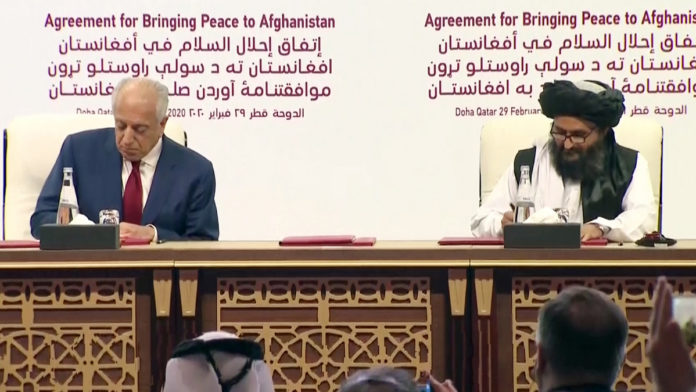Chief negotiators of the United States and Islamic Emirate of Afghanistan (Ex-Taliban) signed a peace agreement of Feb 29 that will regulate withdrawal (runaway) of occupation troops in return for some vague guarantees by the Emirate. Deal has been made possible by President Trump’s electoral compulsions and acumen of Bajwa Doctrine.
The US-Islamic Emirate peace agreement comprises four parts: 1) guarantees to prevent the use of Afghan soil by any international terrorist groups or individuals against the security of the United States and its allies, 2) a timeline for the withdrawal of all U.S. and Coalition forces from Afghanistan, 3) a political settlement resulting from intra-Afghan dialogue and negotiations between the Taliban and an inclusive negotiating team of the Islamic Republic of Afghanistan, and 4) a permanent and comprehensive ceasefire.
Most of all that the US has conceded is easily quantifiable and verifiable in concrete terms; and, most of all that Taliban are required to do is neither easy to quantify nor easy to verify in concrete terms. Here lies the Centre of Gravity fault line of this agreement, which makes it easy for the Americans to walk away from the agreement at a time of their choosing; what they have to do is just create a false flag storm of subjective comments on Taliban’s behavior by accusing them of violence which may not be of their making. And there is no dearth of spoilers in Afghan end game, of these, India is a lead actor always ready to perform rental services to anti-Afghanistan forces.
The peace deal is part of a wider push for Afghan reconciliation and an end to the longest US war. Representatives from fifty countries, foreign ministers of different countries including Pakistan’s Shah Mahmood Qureshi, attending the signing ceremony of the agreement. Pakistan has been a long-time ally in America’s war on terror, it played a critical role in bringing the two sides to the negotiation table. Khalilzad has on multiple occasions appreciated and thanked Pakistan for its constructive role in the peace process.
President Donald Trump had been urging the Afghan people to embrace the chance for a new future, saying the deal held out the possibility of ending the years long conflict. “If the Taliban and the government of Afghanistan live up to these commitments, we will have a powerful path forward to end the war in Afghanistan and bring our troops home,” he said on the eve of the event.
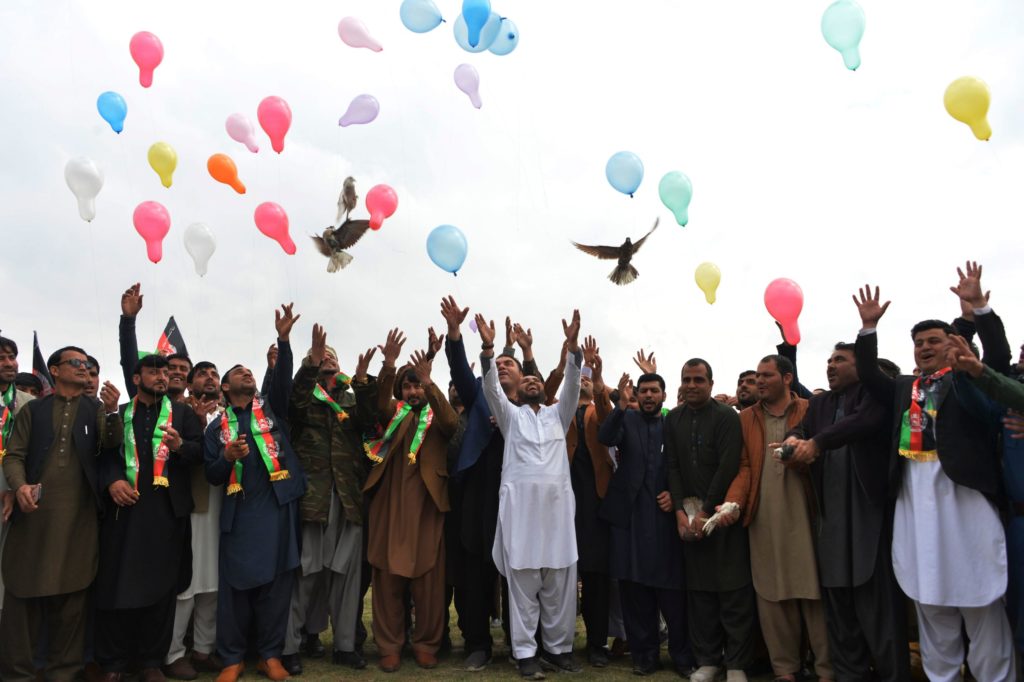
Bajwa doctrine, apart from some of domestic engagements which better be left to political leadership, is a template for bringing peace and security to Pakistan and the region. It is a doctrine of realism focusing on the peaceful coexistence with the neighbouring countries. It was very courageous on the part of Gen Bajwa to tell the Afghan authorities in unequivocal terms that Pakistan has no expansionist designs about Afghanistan. This doctrine openly abandoned the idea (if it ever existed) of strategic depth and Afghanistan as the fifth province of Pakistan. The Bajwa Doctrine seeks total peace on western borders and wants to make Iran and Afghanistan as its erstwhile allies. The doctrine continued its engagement policy with the USA but without being involved in the infighting within Afghanistan. The Bajwa Doctrine envisages Pakistan as a proud peace-loving country which wants peaceful coexistence with the world.
American arrogance is well in place. US Defense Secretary Mark Esper has warned that the United States “will not hesitate to nullify” its historic deal with the Taliban if the insurgents renege on their security guarantees and commitment to hold talks with the Afghan government. “Should the Taliban fail to honour their commitments they will forfeit their chance to sit with fellow Afghans and deliberate on the future of their country,” he said during his visit to Kabul on Saturday. US Secretary of State Mike Pompeo who oversaw the signing called upon the Taliban to honour its commitments to sever ties with militant groups. “I know there will be a temptation to declare victory, but victory for Afghans will only be achieved when they can live in peace and prosper,” he added. He said the Taliban have shown that they have the will to be peaceful during the recent ‘reduction in violence’ period. He added that the agreement will mean nothing “if concrete actions are not taken on commitments and promises”.
Foreign Minister Shah Mahmood Qureshi said Pakistan wants a ‘responsible withdrawal’ of US troops from Afghanistan. He further said that the pact could bring an end to the 18-year war in Afghanistan. The country [Afghanistan] would need the world’s support in rehabilitation and recuperation, added. “Pakistan hopes for intra-Afghan dialogue,” FM Qureshi said. “Pakistan would continue its efforts for lasting peace and stability in Afghanistan.” The US-Taliban deal is a vindication of Pakistan’s stance that there is no military solution to the Afghan imbroglio.
Saturday (Feb 29) is a “monumental day for Afghanistan”, the United States embassy in Kabul said on Twitter, just hours before the signing of a pact. The embassy officials added: “It is about making peace and crafting a common brighter future. We stand with Afghanistan.” Afghanistan, which has been at war since American bombings began in response to 9/11 attacks stands to see an end to the violence that has claimed tens of thousands of lives. The text of Agreement is as follows:-
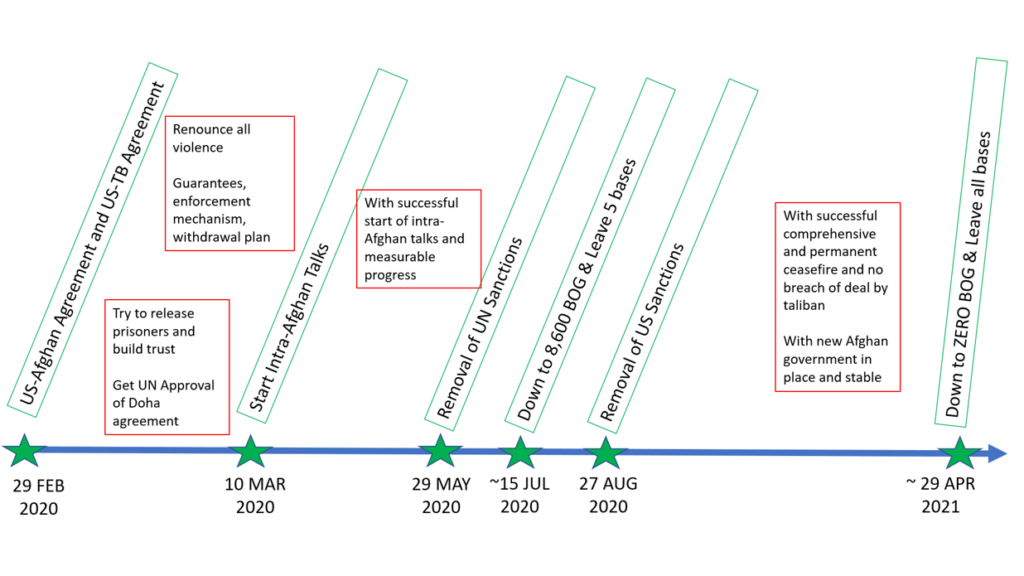
Agreement for Bringing Peace to Afghanistan between the Islamic Emirate of Afghanistan which is not recognized by the United States as a state and is known as the Taliban and the United States of America February 29, 2020
A comprehensive peace agreement is made of four parts:
1. Guarantees and enforcement mechanisms that will prevent the use of the soil of Afghanistan by any group or individual against the security of the United States and its allies.
2. Guarantees, enforcement mechanisms, and announcement of a timeline for the withdrawal of all foreign forces from Afghanistan.
3. After the announcement of guarantees for a complete withdrawal of foreign forces and timeline in the presence of international witnesses, and guarantees and the announcement in the presence of international witnesses that Afghan soil will not be used against the security of the United States and its allies, the Islamic Emirate of Afghanistan which is not recognized by the United States as a state and is known as the Taliban will start intra-Afghan negotiations with Afghan sides on March 10, 2020, which corresponds to Rajab 15, 1441 on the Hijri Lunar calendar and Hoot 20, 1398 on the Hijri Solar calendar.
4. A permanent and comprehensive ceasefire will be an item on the agenda of the intra-Afghan dialogue and negotiations. The participants of intra-Afghan negotiations will discuss the date and modalities of a permanent and comprehensive ceasefire, including joint implementation mechanisms, which will be announced along with the completion and agreement over the future political road-map of Afghanistan.
The four parts above are interrelated and each will be implemented in accordance with its own agreed timeline and agreed terms. Agreement on the first two parts paves the way for the last two parts.
Following is the text of the agreement for the implementation of parts one and two of the above. Both sides agree that these two parts are interconnected. The obligations of the Islamic Emirate of Afghanistan which is not recognized by the United States as a state and is known as the Taliban in this agreement apply in areas under their control until the formation of the new post-settlement Afghan Islamic government as determined by the intra-Afghan dialogue and negotiations.
PART ONE
The United States is committed to withdraw from Afghanistan all military forces of the United States, its allies, and Coalition partners, including all non-diplomatic civilian personnel, private security contractors, trainers, advisors, and supporting services personnel within fourteen (14) months following announcement of this agreement, and will take the following measures in this regard:
A. The United States, its allies, and the Coalition will take the following measures in the first one hundred thirty five (135) days:
1) They will reduce the number of U.S. forces in Afghanistan to eight thousand six hundred (8,600) and proportionally bring reduction in the number of its allies and Coalition forces.
2) The United States, its allies, and the Coalition will withdraw all their forces from five (5) military bases.
B. With the commitment and action on the obligations of the Islamic Emirate of Afghanistan which is not recognized by the United States as a state and is known as the Taliban in Part Two of this agreement, the United States, its allies, and the Coalition will execute the following:
1) The United States, its allies, and the Coalition will complete withdrawal of all remaining forces from Afghanistan within the remaining nine and a half (9.5) months.
2) The United States, its allies, and the Coalition will withdraw all their forces from remaining bases.
C. The United States is committed to start immediately to work with all relevant sides on a plan to expeditiously release combat and political prisoners as a confidence building measure with the coordination and approval of all relevant sides. Up to five thousand (5,000) prisoners of the Islamic Emirate of Afghanistan which is not recognized by the United States as a state and is known as the Taliban and up to one thousand (1,000) prisoners of the other side will be released by March 10, 2020, the first day of intra-Afghan negotiations, which corresponds to Rajab 15, 1441 on the Hijri Lunar calendar and Hoot 20, 1398 on the Hijri Solar calendar. The relevant sides have the goal of releasing all the remaining prisoners over the course of the subsequent three months. The United States commits to completing this goal. The Islamic Emirate of Afghanistan which is not recognized by the United States as a state and is known as the Taliban commits that its released prisoners will be committed to the responsibilities mentioned in this agreement so that they will not pose a threat to the security of the United States and its allies.
D. With the start of intra-Afghan negotiations, the United States will initiate an administrative review of current U.S. sanctions and the rewards list against members of the Islamic Emirate of Afghanistan which is not recognized by the United States as a state and is known as the Taliban with the goal of removing these sanctions by August 27, 2020, which corresponds to Muharram 8, 1442 on the Hijri Lunar calendar and Saunbola 6, 1399 on the Hijri Solar calendar.
E. With the start of intra-Afghan negotiations, the United States will start diplomatic engagement with other members of the United Nations Security Council and Afghanistan to remove members of the Islamic Emirate of Afghanistan which is not recognized by the United States as a state and is known as the Taliban from the sanctions list with the aim of achieving this objective by May 29, 2020, which corresponds to Shawwal 6, 1441 on the Hijri Lunar calendar and Jawza 9, 1399 on the Hijri Solar calendar.
F. The United States and its allies will refrain from the threat or the use of force against the territorial integrity or political independence of Afghanistan or intervening in its domestic affairs.
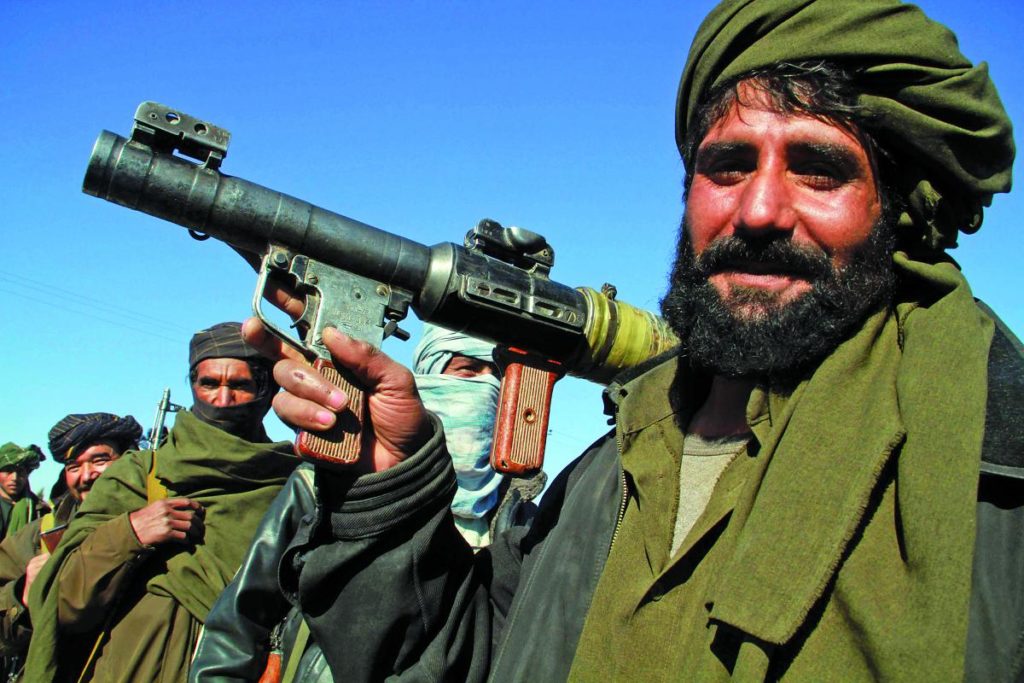
PART TWO
In conjunction with the announcement of this agreement, the Islamic Emirate of Afghanistan which is not recognized by the United States as a state and is known as the Taliban will take the following steps to prevent any group or individual, including al-Qa’ida, from using the soil of Afghanistan to threaten the security of the United States and its allies:
1. The Islamic Emirate of Afghanistan which is not recognized by the United States as a state and is known as the Taliban will not allow any of its members, other individuals or groups, including al-Qa’ida, to use the soil of Afghanistan to threaten the security of the United States and its allies.
2. The Islamic Emirate of Afghanistan which is not recognized by the United States as a state and is known as the Taliban will send a clear message that those who pose a threat to the security of the United States and its allies have no place in Afghanistan, and will instruct members of the Islamic Emirate of Afghanistan which is not recognized by the United States as a state and is known as the Taliban not to cooperate with groups or individuals threatening the security of the United States and its allies.
3. The Islamic Emirate of Afghanistan which is not recognized by the United States as a state and is known as the Taliban will prevent any group or individual in Afghanistan from threatening the security of the United States and its allies, and will prevent them from recruiting, training, and fundraising and will not host them in accordance with the commitments in this agreement.
4. The Islamic Emirate of Afghanistan which is not recognized by the United States as a state and is known as the Taliban is committed to deal with those seeking asylum or residence in Afghanistan according to international migration law and the commitments of this agreement, so that such persons do not pose a threat to the security of the United States and its allies.
5. The Islamic Emirate of Afghanistan which is not recognized by the United States as a state and is known as the Taliban will not provide visas, passports, travel permits, or other legal documents to those who pose a threat to the security of the United States and its allies to enter Afghanistan.
PART THREE
1. The United States will request the recognition and endorsement of the United Nations Security Council for this agreement.
2. The United States and the Islamic Emirate of Afghanistan which is not recognized by the United States as a state and is known as the Taliban seek positive relations with each other and expect that the relations between the United States and the new post-settlement Afghan Islamic government as determined by the intra-Afghan dialogue and negotiations will be positive.
3. The United States will seek economic cooperation for reconstruction with the new post-settlement Afghan Islamic government as determined by the intra-Afghan dialogue and negotiations, and will not intervene in its internal affairs.
Signed in Doha, Qatar on February 29, 2020, which corresponds to Rajab 5, 1441 on the Hijri Lunar calendar and Hoot 10, 1398 on the Hijri Solar calendar, in duplicate, in Pashto, Dari, and English languages, each text being equally authentic.
[SOURCE: Al Jazeera News https://www.aljazeera.com/news/2020/02/afghanistan-taliban-sign-deal-america-longest-war-200213063412531.html]
Concurrently, the following Joint Declaration was signed between the US and the Islamic Republic of Afghanistan to fill in the gaps with regard to implementation framework:
Joint Declaration between the Islamic Republic of Afghanistan and the United States of America for Bringing Peace to Afghanistan.
The Islamic Republic of Afghanistan, a member of the United Nations and recognized by the United States and the international community as a sovereign state under international law, and the United States of America are committed to working together to reach a comprehensive and sustainable peace agreement that ends the war in Afghanistan for the benefit of all Afghans and contributes to regional stability and global security. A comprehensive and sustainable peace agreement will include four parts: 1) guarantees to prevent the use of Afghan soil by any international terrorist groups or individuals against the security of the United States and its allies, 2) a timeline for the withdrawal of all U.S. and Coalition forces from Afghanistan, 3) a political settlement resulting from intra-Afghan dialogue and negotiations between the Taliban and an inclusive negotiating team of the Islamic Republic of Afghanistan, and 4) a permanent and comprehensive ceasefire. These four parts are interrelated and interdependent. Pursuit of peace after long years of fighting reflects the goal of all parties who seek a sovereign, unified Afghanistan at peace with itself and its neighbors.
The Islamic Republic of Afghanistan and the United States have partnered closely since 2001 to respond to threats to international peace and security and help the Afghan people chart a secure, democratic and prosperous future. The two countries are committed to their longstanding relationship and their investments in building the Afghan institutions necessary to establish democratic norms, protect and preserve the unity of the country, and promote social and economic advancements and the rights of citizens. The commitments set out here are made possible by these shared achievements. Afghan and U.S. security forces share a special bond forged during many years of tremendous sacrifice and courage. The Islamic Republic of Afghanistan and the people of Afghanistan reaffirm their support for peace and their willingness to negotiate an end to this war.
The Islamic Republic of Afghanistan welcomes the Reduction in Violence period and takes note of the U.S-Taliban agreement, an important step toward ending the war. The U.S-Taliban agreement paves the way for intra-Afghan negotiations on a political settlement and a permanent and comprehensive ceasefire. The Islamic Republic of Afghanistan reaffirms its readiness to participate in such negotiations and its readiness to conclude a ceasefire with the Taliban
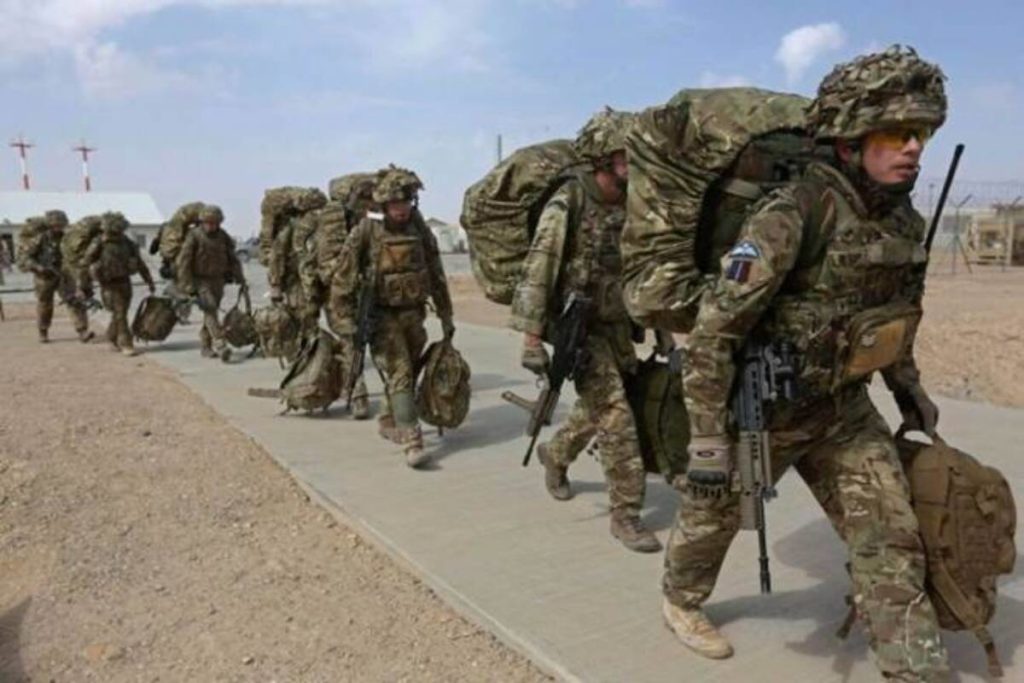
The Islamic Republic of Afghanistan furthermore reaffirms its ongoing commitment to prevent any international terrorist groups or individuals, including al-Qa’ida and ISIS-K, from using Afghan soil to threaten the security of the United States, its allies and other countries. To accelerate the pursuit of peace, the Islamic Republic of Afghanistan confirms its support for the phased withdrawal of U.S. and Coalition forces subject to the Taliban’s fulfillment of its commitments under the U.S. Taliban agreement and any agreement resulting from intra-Afghan negotiations.
The Islamic Republic of Afghanistan and the United States therefore have made the following commitments:
PART ONE
The Islamic Republic of Afghanistan and the United States recognize that al-Qa’ida, ISIS-K and other international terrorist groups or individuals continue to use Afghan soil to recruit members, raise funds, train adherents and plan and attempt to conduct attacks that threaten the security of the United States, its allies, and Afghanistan. To address this continuing terrorist threat, the Islamic Republic of Afghanistan and the United States will continue to take the following steps to defeat al-Qa’ida, its affiliates, and other international terrorist groups or individuals:
1. The Islamic Republic of Afghanistan reaffirms its continued commitment not to cooperate with or permit international terrorist groups or individuals to recruit, train, raise funds (including through the production or distribution of narcotics), transit Afghanistan or misuse its internationally recognized travel documents, or conduct other support activities in Afghanistan, and will not host them.
2. The United States re-affirms its commitments regarding support for the Afghan security forces and other government institutions, including through ongoing efforts to enhance the ability of Afghan security forces to deter and respond to internal and external threats, consistent with its commitments under existing security agreements between the two governments. This commitment includes support to Afghan security forces to prevent al-Qa’ida, ISIS-K, and other international terrorist groups or individuals from using Afghan soil to threaten the United States and its allies.
3. The United States re-affirms its readiness to continue to conduct military operations in Afghanistan with the consent of the Islamic Republic of Afghanistan in order to disrupt and degrade efforts by al-Qa’ida, ISIS-K, and other international terrorist groups or individuals to carry out attacks against the United States or its allies, consistent with its commitments under existing security agreements between the two governments and with the existing understanding that U.S. counter-terrorism operations are intended to complement and support Afghan security forces’ counter-terrorism operations, with full respect for Afghan sovereignty and full regard for the safety and security of the Afghan people and the protection of civilians.
4. The United States commits to facilitate discussions between Afghanistan and Pakistan to work out arrangements to ensure neither country’s security is threatened by actions from the territory of the other side.
PART TWO
The Islamic Republic of Afghanistan and the United States have consulted extensively on U.S. and Coalition force levels and the military activities required to achieve the foregoing commitments including through support to Afghan security and defense forces. Subject to the Taliban’s fulfillment of its commitments under the U.S-Taliban agreement, the Islamic Republic of Afghanistan, the United States, and the Coalition jointly assess that the current levels of military forces are no longer necessary to achieve security objectives; since 2014, Afghan security forces have been in the lead for providing security and have increased their effectiveness. As such, the parties commit to take the following measures:
1. The United States will reduce the number of U.S. military forces in Afghanistan to 8,600 and implement other commitments in the U.S. Taliban agreement within 135 days of the announcement of this joint declaration and the U.S.-Taliban agreement, and will work with its allies and the Coalition to reduce proportionally the number of Coalition forces in Afghanistan over an equivalent period, subject to the Taliban’s fulfillment of its commitments under the U.S. Taliban agreement.
2. Consistent with the joint assessment and determination between the United States and the Islamic Republic of Afghanistan, the United States, its allies, and the Coalition will complete the withdrawal of their remaining forces from Afghanistan within 14 months following the announcement of this joint declaration and the U.S-Taliban agreement, and will withdraw all their forces from remaining bases, subject to the Taliban’s fulfillment of its commitments under the U.S-Taliban agreement.
3. The United States re-affirms its commitment to seek funds on a yearly basis that support the training, equipping, advising and sustaining of Afghan security forces, so that Afghanistan can independently secure and defend itself against internal and external threats.
4. To create the conditions for reaching a political settlement and achieving a permanent, sustainable ceasefire, the Islamic Republic of Afghanistan will participate in a U.S. facilitated discussion with Taliban representatives on confidence building measures, to include determining the feasibility of releasing significant numbers of prisoners on both sides. The United States and Islamic Republic of Afghanistan will seek the assistance of the ICRC to support this discussion.
5. With the start of intra-Afghan negotiations, the Islamic Republic of Afghanistan commits to start diplomatic engagement with members of the UN Security Council to remove members of the Taliban from the sanctions list with the aim of achieving this objective by May 29, 2020, and in any case no later than 30 days after finalizing a framework agreement and a permanent and comprehensive ceasefire.
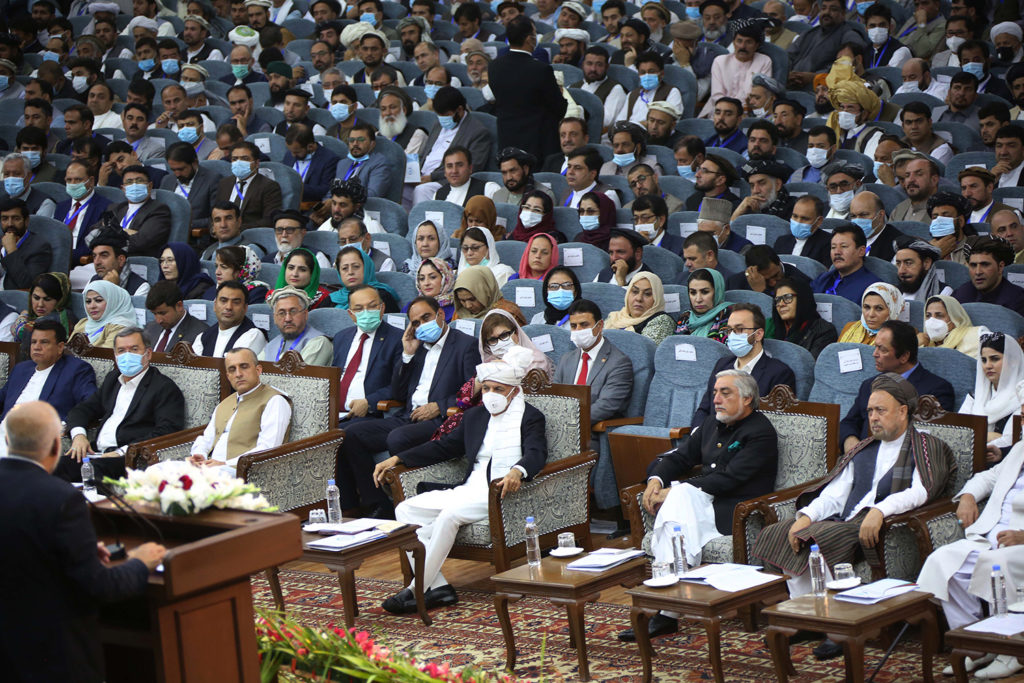
PART THREE
1. The United States will request the recognition and endorsement of the UN Security Council for this agreement and related arrangements.
2. The United States and the Islamic Republic of Afghanistan are committed to continue positive relations, including economic cooperation for reconstruction.
3. The United States will refrain from the threat or the use of force against the territorial integrity or political independence of Afghanistan or intervening in its domestic affairs.
4. The United States will continue to work to build regional and international consensus to support the ongoing effort to achieve a political settlement to the principal conflict in Afghanistan.
[Source: State Department: https://www.state.gov/wpcontent/uploads/2020/02/02.29.20-US-Afghanistan-Joint-Declaration.pdf]
Observers and analysts believe the deal cannot be called a peace deal but rather an agreement that would pave the way for an intra-Afghan dialogue. It is subsequent talks between the Taliban and other Afghan groups, including the current Kabul government that could smoothen out crucial issues such as the post-US troops’ withdrawal political set up, a permanent ceasefire and rights of minorities, women and other matters. But the position of the Afghan government, which has been excluded from direct US-Taliban talks, remains unclear and the country is gripped by a fresh political crisis amid contested election results and their non-implementation. Many expect that talks to come between the multiple Afghan sides will be far more complicated.
Senator Elizabeth Warren of Massachusetts, who said during a Democratic presidential debate that the government has “a sacred responsibility to” American soldiers. “That is not to use our military to solve problems that cannot be solved militarily. We are not winning in Afghanistan. We are not winning in the Middle East,” she said.
The US spent more than $750 billion, with indirect cost factored in tally nears $ 1.5 trillion. Yet it’s also a conflict that is frequently ignored by US politicians and the American public to avoid embarrassment. After over 18 years of death and destruction, American side has nothing to project as a worthwhile gain. Agreement is a sort of glorified surrender for the US, while Taliban have been able to achieve almost all of their objectives. Pompeo said, “We’re proud of our gains, but our generals have determined that this war is unlikely to be won militarily without tremendous additional resources. All sides are tired of fighting.”
History will judge Trump, in due course, whether he capsized in Afghanistan in line with his electoral promise or to hurriedly spare soldiers deployed in Afghanistan for starting a new war in Iran. Trump, as he seeks re-election this year, is looking to make good on his campaign promise to bring troops home from all war theaters. Last September, on short notice, he called off what was to be a signing ceremony with the Taliban at Camp David after a series of new Taliban attacks. Yet, he has approached the Taliban agreement cautiously, steering clear of the crowing surrounding other major foreign policy actions, such as his talks with North Korea. Trump will go down in the history as a President who was able to bring back a comprehensive American defeat in a victory animated wrapper.
If the agreement is successful, Afghanistan, the “graveyard of empires” that has repeatedly repelled foreign invaders from imperial Britain and Russia to the Soviet Union, will have once again successfully turned away a world power from its landlocked borders.
But prospects for Afghanistan’s future are uncertain. The agreement sets the stage for peace talks involving Afghani factions, which are likely to be complicated and long drawn out. There are also questions about whether Taliban fighters loyal to various warlords will be willing to disarm.
According to BBC, analysts have warned that the Taliban doesn’t appear to be in the mood for concessions. They are presenting the agreement to their supporters as a “victory”. The Taliban do however appear to want international legitimacy and recognition. The fanfare around the ceremony in Doha has given them that, and they may feel negotiations offer the best chance of achieving their additional aims. The priority for many ordinary Afghans, at least in the short term, is a substantive reduction in violence. Actual test shall be both sides’ military behaviour during upcoming “fighting season”, if that will happen.
Pakistan has played a key role in brokering the deal between the US and the Taliban since it not only facilitated the talks but also persuaded the insurgents to show flexibility on the issue of reduction of violence as well as an intra-Afghan dialogue. Other than Afghanistan, no other country has greater stakes in the success of this agreement, how so ever flawed it may be.


